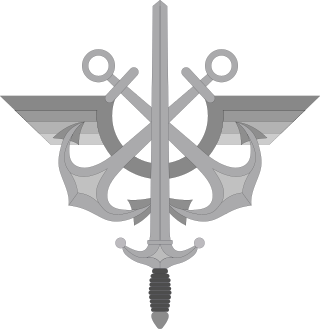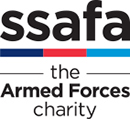Related Research Articles

The British Army is the principal land warfare force of the United Kingdom, a part of the British Armed Forces along with the Royal Navy and the Royal Air Force. As of 1 April 2023, the British Army comprises 77,536 regular full-time personnel, 4,179 Gurkhas, 27,194 volunteer reserve personnel and 4,530 "other personnel", for a total of 113,439.

The Army of the Czech Republic, also known as the Czech Army, is the military service responsible for the defence of the Czech Republic as part of the Armed Forces of the Czech Republic alongside the Military Office of the President of the Republic and the Castle Guard. The Army consists of the General Staff, the Land Forces, the Air Force and support units.

The French Armed Forces are the military forces of France. The armed forces consists of four military branches: the Army, Navy, Air and Space Force and the National Gendarmerie. The National Guard serves as the French Armed Forces' military reserve force. As stipulated by France's constitution, the president of France serves as commander-in-chief of the French military. France has the eighth largest defence budget in the world and the second largest in the European Union (EU). It also has the largest military by size in the EU. A 2015 Credit Suisse report ranked the French Armed Forces as the world's sixth-most powerful military.

The British Armed Forces, formally known as His Majesty's Armed Forces, are the military forces responsible for the defence of the United Kingdom, its Overseas Territories and the Crown Dependencies. They also promote the UK's wider interests, support international peacekeeping efforts and provide humanitarian aid.

The Royal Military Police (RMP) is the corps of the British Army responsible for the policing of army service personnel, and for providing a military police presence both in the UK and while service personnel are deployed overseas on operations and exercises. Members of the RMP are often known as 'Redcaps' because of the scarlet covers on their peaked caps and scarlet coloured berets.
The Royal British Legion (RBL), formerly the British Legion, is a British charity providing financial, social and emotional support to members and veterans of the British Armed Forces, their families and dependants, as well as all others in need.
Counter-recruitment refers to activity opposing military recruitment, in some or all of its forms. Among the methods used are research, consciousness-raising, political advocacy and direct action. Most such activity is a response to recruitment by state armed forces, but may also target intelligence agencies, private military companies, and non-state armed groups.

Military recruitment refers to the activity of attracting people to, and selecting them for, military training and employment.

SSAFA, the Armed Forces charity, the Soldiers', Sailors', and Airmen's Families Association, is a UK charity that provides lifelong support to serving men and women and veterans from the British Armed Forces and their families or dependents. Anyone who is currently serving or has ever served in the Royal Navy, British Army or Royal Air Force and their families, both regulars and reserves, is eligible for their help.

General Francis Richard Dannatt, Baron Dannatt,, is a retired senior British Army officer and member of the House of Lords. He was Chief of the General Staff from 2006 to 2009.

Military personnel or military service members are members of the state's armed forces. Their roles, pay, and obligations differ according to their military branch, rank, and their military task when deployed on operations and on exercise.

Help for Heroes is a British charity which supports members of the British Armed Forces community with their physical and mental health, as well as their financial, social and welfare needs. The charity was founded in 2007 by Bryn and Emma Parry after they visited soldiers at Selly Oak Hospital in Birmingham. The charity now supports all veterans, serving personnel, those who have served alongside the UK military, and their families.
Smith and Grady v UK (1999) 29 EHRR 493 was a notable decision of the European Court of Human Rights that unanimously found that the investigation into and subsequent discharge of personnel from HM Forces on the basis they were homosexual was a breach of their right to a private life under Article 8 of the European Convention on Human Rights. The decision, which caused widespread controversy at the time led the UK to adopt a revised sexual-orientation-free Armed Forces Code of Social Conduct in January 2000. In UK law the decision is notable because the applicants' case had previously been dismissed in both the High Court and Court of Appeal, who had found that the authorities' actions had not violated the principles of legality including Wednesbury unreasonableness, thus highlighting the difference in approach of the European Court of Human Rights and the domestic courts.

European countries have had varying policies that confine women and military service or the extent of their participation in the national armed services of their respective countries, especially combatant roles in armed conflicts or hostile environments. While most of the countries have always allowed women to participate in military activities involving no direct aggression with the enemy, most began seeing the value of servicewomen in the armed services during the First World War when they began losing unprecedented numbers of servicemen. In the modern era, many of the European countries allow women to voluntarily pursue a career path or profession in the national armed services of their country as well as permit conscription equality, with minimal or no restrictions at all.
Gay and lesbian citizens have been allowed to serve openly in His Majesty's Armed Forces since 2000. The United Kingdom's policy is to allow lesbian, gay, bisexual, transgender, and queer (LGBTQ) personnel to serve openly, and discrimination on a sexual orientation basis is forbidden. It is also forbidden for someone to pressure LGBT people to come out. All personnel are subject to the same rules against sexual harassment, regardless of gender or sexual orientation.
The Regular Reserve is the component of the military reserve of the British Armed Forces whose members have formerly served in the "Regular" forces. The Regular Reserve largely consists of ex-Regular personnel who retain a statutory liability for service and are liable to be recalled for active military duty "in case of imminent national danger or great emergency". It also consists of a smaller number of ex-Regulars who serve under a fixed-term reserve contract and are liable for reporting, training and deploying on operations.
The National Security Strategy and Strategic Defence and Security Review 2015 was published by the British government during the second Cameron ministry on 23 November 2015 to outline the United Kingdom's defence strategy up to 2025. It identified key threats to the UK and the capabilities it required to address them.

The minister of state for veterans' affairs is a ministerial position in the Cabinet Office in the British government, currently held by Johnny Mercer who took the office on 25 October 2022. Earlier, it was jointly with the Ministry of Defence. The officeholder has attended cabinet since 7 July 2022.

The Armed forces in Wales are the military bases and organisation in Wales or associated with Wales. This includes servicemen and women from Wales and Welsh regiments and brigades of the British Armed Forces.
References
- ↑ "What is the military covenant?", The Guardian, UK, Mar 4, 2008
- ↑ "Core Values and the Military Covenant", Army Jobs, UK: MoD.
- ↑ "Brown hits back on forces funding". News. BBC. 23 November 2007.
- ↑ Walker, Peter (23 November 2007). "Defence secretary hits back at admiral's criticism". The Guardian. London.
- ↑ Harding, Thomas; Borland, Sophie (23 November 2007). "Army funding shortage 'is insult to troops'". The Daily Telegraph. London. Archived from the original on 27 November 2007. Retrieved 5 November 2021.
- ↑ British Army, archived from the original on October 13, 2008.
- ↑ Soubry, A., MOD Welfare Conference - Speech by Anna Soubry, Minister for Defence Personnel, Welfare and Veterans, 19 March 2014, accessed 15 August 2020
- ↑ BBC Ethics Guide: Military Covenant, publishes 18 September 2007, accessed 15 August 2020
- ↑ Evans, Michael (3 April 2000), "Army covenant tells soldiers to expect sacrifice", The Times, London, ENG, UK, p. 7.
- ↑ Burke, Jason (15 October 2006), "Richard Dannatt: The no-nonsense Christian soldier", The Observer, UK, p. 45.
- ↑ Jones, George (13 January 2007), "We need to spend more on armed forces, admits Blair", The Daily Telegraph, UK.
- ↑ Townsend, Mark (9 September 2007), "Army inquest backlog grows: Widows must wait longer for results because coroner has yet to receive promised funds", The Observer, UK, p. 2
- ↑ "Cameron (October 2007), "Speech in full", News (online ed.), UK: The BBC.
- ↑ Taylor, Matthew; Norton-Taylor, Richard (23 November 2007), "Priority NHS treatment promised to war veterans", The Guardian, UK, p. 1.
- ↑ Barker, Alex (23 November 2007), "Brown under attack over armed forces", The Financial Times, London, ENG, UK, p. 2.
- ↑ Paragraph 72, Limbu & Ors, R (on the application of) v Secretary of State for the Home Department & Ors 2008 EWHC 2261 (Admin; 30 September 2008).
- ↑ Military covenant commission, archived from the original on 2014-12-20, retrieved 2013-11-14.
- ↑ "Military Covenant to be enshrined in law".
- ↑ "David Cameron confirms military covenant 'law' plans". BBC News. 15 May 2011.
- ↑ Hopkins, Nick (17 February 2011). "MPs block military covenant". The Guardian . London. Retrieved 17 February 2011.